Los Angeles Lakers: 3 reasons they lost in the first round of the NBA playoffs

3 reasons the Los Angeles Lakers lost: Poor offseason moves
This offseason the Los Angeles Lakers, fresh off a championship, could have rested on their laurels. Instead, they were aggressive in turning over parts of this team around their core of LeBron James and Anthony Davis. That included trading for Dennis Schroder and signing Montrezl Harrel, Marc Gasol and, later on the buyout market, Andre Drummond.
Every single one of those signings, with the possible exception of Marc Gasol, turned out to be a net negative for this team. Schroder was a solid two-way point guard when James and Davis were both healthy, but he was brought in to help carry the offense when they were off the court. He was unable to do that, wilting ultimately in their first-round series. He wasn’t able to help check Devin Booker, who averaged 29.7 points per game. On the other end, he was abysmal, averaging 14.3 points per game on 40.0 percent shooting from the field and 30.8 shooting from 3-point range.
The Lakers acquired Schroder by giving up both Danny Green and a first-round pick. Green especially would have been helpful in this series in slowing down Booker, and for a Lakers team whose spacing was strangled his outside shooting would have been a boon. It’s also not a stretch to think that the Lakers could have used that first-round pick on a player who could have helped this year: Jaden McDaniels, Malachi Flynn and Desmond Bane went just after they would have been on the clock.
More from Los Angeles Lakers
- NBA Trades: The Lakers bolster their frontcourt in this deal with the Pacers
- A surprise LeBron ranking should raise alarm bells for the Lakers
- Surprising Austin Reaves contract detail confirms Lakers got him for a steal
- Instant Grades for the Lakers’ unprecedented Anthony Davis extension
- Report: Lakers have big plans for recent top-10 pick amid roster shakeup
Let’s pivot to the center position, which was a low-cost strength for the Lakers last season. Dwight Howard and JaVale McGee soaked up the regular-season minutes, and then their minutes reduced in the playoffs as Davis played more of his minutes at the 5. The Lakers decided to move from low usage rim protectors to offense-oriented options in Montrezl Harrell and Andre Drummond. To sign Harrell they sacrificed their mid-level exception; to get Drummond on the buyout market they clearly promised him a starting role.
Harrell was unplayable for the Lakers against the Suns, too small to check DeAndre Ayton and little help keeping Booker off the rim. Drummond was entrenched as the starter, tying Frank Vogel’s hands as he was forced to keep Davis at the 4 and bring Gasol off the bench.
What was the opportunity cost of signing Harrell instead of another player using the non-taxpayer mid-level exception (NT-MLE)? The Lakers had to look no further than across the court at Jae Crowder, who signed this offseason with the Suns at the same number as Harrell.
Rather than improve this offseason, the Lakers pretty clearly took a step backward. The front office should deservedly receive credit for the moves it made to bring this organization a title last year. This time around? They blew it, adding regular-season players who were worse in the playoffs when this team expected to compete the most.
Perhaps it seems harsh to criticize the front office when this team lost its second-best player to injury. Clearly, the Lakers would have been more successful with Davis playing. Yet even if they won a series or two with a healthy Davis, it would have simply been papering over the reality of this flawed roster.
The Denver Nuggets similarly lost its second-best player to injury. Yet their moves in the last year made their team better, not worse, since they met the Lakers in last year’s Western Conference Finals. Facundo Campazzo has survived stepping into a larger role after signing with the Nuggets in the offseason. Aaron Gordon played high-level defense and hit an important shot in the Nuggets’ closeout Game 6. Buyout signing Austin Rivers played clutch minutes all series long.
The Lakers should receive criticism for surrounding James and Davis with worse players than they had a season ago. Not only did the players underperform, but the theory of them was always going to be worse than what the Lakers had a season ago.